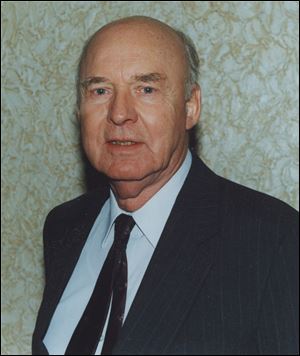
FEATURED EDITORIAL
Mayors, then and now
The death of a former Toledo mayor stimulates reflections on party weaknesses in this year’s campaign
10/8/2013
Potter
John Potter, who died last week at the age of 94, was a Republican mayor of Toledo a half-century ago, within the memory of many living Toledoans. In those years, the GOP routinely fielded full slates of candidates for city offices — and many of them, such as Mr. Potter, got elected.
Contrast the politics of that era with this year’s city election campaigns. Incumbent Mayor Mike Bell, a political independent, has shunned the endorsement of the Lucas County Republican Party’s executive committee. Several former Republicans who are running for council now insist they are independents as well.
That may be because Toledo is perceived — correctly — as a predominantly Democratic city, but the local Democratic Party has had its own problems this year. Two well-known Democratic candidates for mayor failed to survive the primary, while City Councilman D. Michael Collins, another independent, is challenging Mr. Bell. Mr. Collins has since attracted the support of several Democratic and union leaders, but not of the local party itself.
Mr. Potter’s six-year tenure as Toledo mayor suggests that partisanship need not be an obstacle to governing. He was elected to City Council in 1961, part of a GOP majority composed of political neophytes, on a platform that asked voters whether they had “had enough” of the incumbent Democratic-run council.
In the practice of the time, Mr. Potter’s council colleagues named him mayor after the 1961 election and again in 1963. Under a change in the city charter, voters directly elected him mayor in 1965.
Despite his lack of political experience — he was a lawyer — Mayor Potter presided over a city that grew rapidly in size, population, and number of jobs. He oversaw the annexation of territory and several projects aimed at urban renewal and reviving downtown Toledo, if not enough to satisfy his detractors.
One of Mr. Potter’s biggest ideas may have been his electoral undoing: He proposed an ordinance that would have outlawed racial discrimination in housing throughout the city. In the 1967 primary election, Toledoans voted 2-to-1 against the law; critics accused the mayor of botching its presentation.
By that year’s general election, enthusiasm for Mr. Potter had waned. The Blade endorsed his Democratic opponent, William Ensign, who went on to win the general election. This page, which also had opposed him when he ran in 1965, dismissed Mayor Potter’s “sorry tenure.” Yet in the hindsight of nearly five decades, Mr. Potter appears more qualified — and dignified — than several more-recent mayoral candidates.
Two years after Mr. Potter’s failed re-election bid, he was elected to the Ohio Court of Appeals. In 1982, President Ronald Reagan named him to U.S. District Court in Toledo. Judicial colleagues and lawyers who appeared before him said he was a legal scholar and scrupulously fair to all parties. He went on senior status in 1992 and retired in 2004.
Despite the current antics in Washington, partisanship need not be a dirty word. But it requires both parties, in Toledo as everywhere else, to slate high-quality candidates who seek to serve the public interest rather than special interests, who appreciate the difference between political principles and rigid ideology, and who realize that politics is the art of the possible — not an all-or-nothing exercise in brinkmanship.
If both local parties could find and run such candidates, Toledo voters might be inspired enough to exceed the 15-percent turnout for this year’s primary.